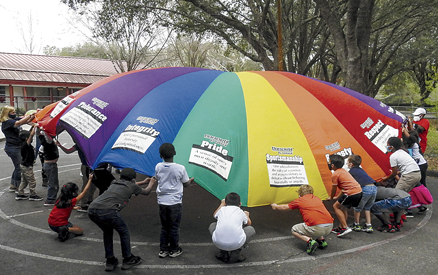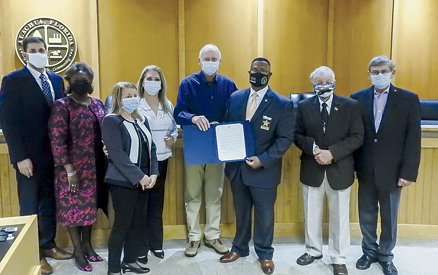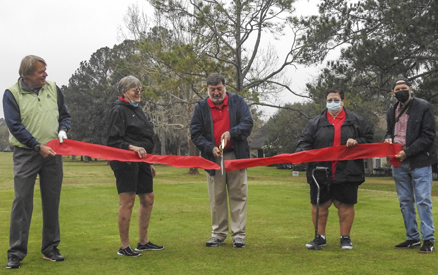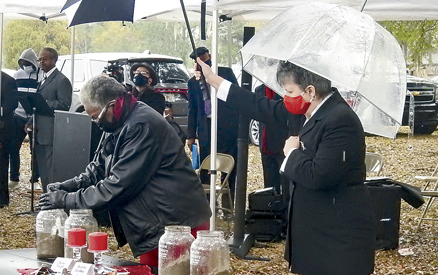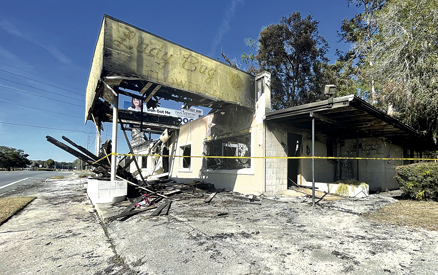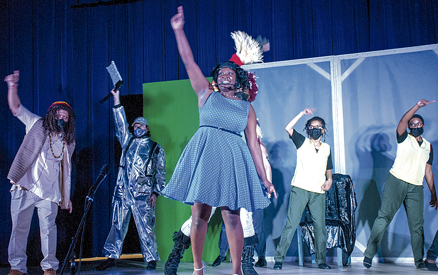NEWBERRY ‒ On Jan. 5, 2021, several dozen people joined together at a location known to some as Lynch Hammock to memorialize African Americans who were hanged at that site over a century earlier.
Florida was a different place in 1916. Much of the racial tension and animosity from the Civil War and its after-effects on the South still festered. There was no equality between white southerners and former black slaves and equal treatment under the law did not yet exist.
One of the ways African Americans were intimidated was the threat of mob violence, particularly lynchings. Florida had the second highest rate of lynchings per capita and Alachua County had the fifth highest rate in the state. While much of this history in the century after the Civil War has been forgotten, the memory of these events has remained in the oral history handed down in the African American community.
In the early morning hours of Aug. 19, 1916, Constable George Wynne, Dr. L.G. Harris, and G.H. Blount drove to Boisey Long's home in Jonesville to serve a warrant and question him about stolen hogs.
Gunfire was exchanged with Long, although it is unknown who fired first, and all three men were wounded. Long escaped while the other men were taken for medical help. Wynne's wounds were serious, and he died on the train to a Jacksonville hospital. Constable Wynne was related to the Dudleys, a long-time prominent family in the area, and a mob formed at their home.
During the search for Long, the mob seized six other African Americans in the area, most of whom were related to Long. James Dennis was suspected of hiding Long, and he was shot to death by the mob. Local law enforcement helped the mob round up five other African Americans and hold them in the Newberry jail.
The five were Dennis' brother, Gilbert, and his sister, Mary, who was pregnant and the mother of four; Stella Young, Long's partner and mother of his son; Andrew McHenry, who was Stella's brother; and the Rev. Joshua Baskin, a farmer and pastor.
The mob took them from the jail to the Newberry picnic grounds (W. Newberry Road and County Road 235) and hanged them. Over 200 people attended the lynchings. Long was captured two days later. He was tried on Sept. 7, found guilty by an all-white jury who deliberated only seven minutes, and sentenced to hang. Long was executed in the yard of the Alachua County jail on Oct. 27, 1916.
While the African American community was outraged about the lynchings, they did not have the law officials on their side. No arrests were ever made for the murders. A newspaper in Ocala reported that the coroner's jury had returned a verdict that the lynching victims had died in freak accidents, such as running into a barbed wire fence and bleeding to death, falling out of a tree breaking their necks or choking to death.
The incident became known as the Newberry 6, but faded from memory as time passed. The area where it occurred became known as Lynch Hammock and according to Newberry Mayor Jordan Marlowe, there were other lynchings over the years at that location that led to its name.
Twenty years ago, Dr. Patricia Hillard Nunn researched the incident and brought it back into the limelight. She also started the Truth and Reconciliation Project to expose the history of intimidation and terror against blacks and helped to create a historical marker at the spot. It is unknown if the actual hanging tree still exists, but over the past few years, ceremonies have been held at the site in memory of those who lost their lives to the lynchings.
On Jan. 5, 2021, under a cold and rainy sky, the City of Newberry, Concerned Citizens of Newberry, the Rosewood Foundation and the Equal Justice Initiative (EJI) combined to hold a Soil Collection ceremony at the location in remembrance of the Newberry 6 and other lynchings that occurred in Alachua County.
Two mason jars for each of the six victims’ names were set on three tables along with two nameless jars to honor the other unknown victims of lynchings. The jars were set between red candles and surrounded by broken shards of pottery to represent the shattered lives of their families.
Despite the dreary weather, several dozen people attended the event. Stanley Richardson read a poem about how the lynchings changed his view of the large oak trees from beauty to symbols of murder and intimidation, with the tree itself a victim and tool of mob terror.
“All my life I heard whispers in bits and pieces among my family about the lynchings, never knowing the full facts until I was an adult,” Richardson said. Pastor Armon Lowery sang the classic Billie Holiday song “Strange Fruit” that also speaks of the lynching trees and the bloody fruit they bare.
Keiana West represented the EJI, which is based in Montgomery, Alabama, and spoke about its mission to memorialize all victims of lynchings and how they have documented over 4,000 known incidents.
Other speakers included, Alachua County Commissioner Charles Chestnut, Newberry Mayor Jordan Marlowe and Warren Lee, who spoke on behalf of the victims.
As the song “Amazing Grace” was played, descendants of the victims scooped soil from the site into the jars, followed by attendees until each jar was filled. One of each victim's jars will be kept in Newberry as a memorial to their deaths while the other jar will be taken to a memorial to lynching victims in Montgomery.
The EJI maintains a collection of jars filled with soil from the sites of over 3,000 documented lynchings along with a black granite memorial in remembrance of all the victims. “While we have this documentation, we believe this is just a fraction of the violent deaths inflicted on African Americans from 1865 to 1950 to intimidate and control them. We want to make sure this history is not forgotten,” said West
# # #
Email rcarson@
alachuatoday.com


